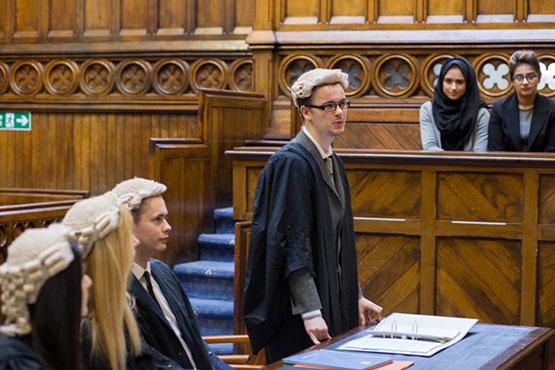
Professor Engobo Emeseh
Head of Law School / Professor

LLM
Suitable for applications.
All activities are digitally enabled. This includes access to materials, textbook(s), and discussion boards.
This is complemented by synchronous online tutorials with the tutor(s).
Summative assessments will be submitted digitally and there will be plenty of formative assessments, and self and peer assessments to help you prepare.
A range of assessment methods is adopted across different modules such as critical essays, short reports, oral presentations, reflective journals, and poster presentations.
The programme also provides opportunities for students to be involved in the design of their own assessment or to contextualise their answers to summative assessment tasks in some modules.

Students have the opportunity to receive formal training on immigration law, leading to the award of OISC (Office of the Immigration Services Commissioner) Level 1 and 2 qualifications, through collaboration with CHAS@StVincent's.
This gives students the opportunity to be involved in giving immigration advice whilst earning recognised qualifications.

Our students have the opportunity to get involved in a range of internal and external mooting competitions.
Mooting complements students' legal education and is a great way to learn how to use the law to create persuasive legal arguments. Students have to analyse problems, research the law, prepare written submissions and present their arguments to a trained lawyer or judge.
The competition imitates the procedures followed in appeal courts, and is a great chance for students to put their skills and knowledge into practice.
You will be allocated a personal tutor - someone with whom you will be able to talk about any academic or personal concerns. Staff responsible for the administration of the LLM are available to help you with day-to-day queries about the programme.
We are a small, dedicated and friendly Law School, allowing our academic and support staff to get to know students personally, and offer individual support and teaching. We make sure that your time with us is as rewarding as possible, and do everything we can to help you reach your potential.
The Law Library has dedicated support from our Law Librarian, who will be able to provide you with guidance on the use of legal databases, OSCOLA referencing or finding a book in the library.
As well as offering access to key textbooks and other materials in hard copy, the law library also subscribes to three of the key legal databases:
You'll therefore have 24-hour electronic access, on and off campus, to the majority of material you require to successfully complete your programme. Where tutors require you to read material which is not as readily available, it will be made available to you though our Canvas VLE. You are encouraged to also consult other collections as there is interesting and useful material on all of the topics studied available from a variety of disciplines, and you will therefore be introduced to the library as a whole rather than just specific collections as part of this programme.
Our core research theme is law as a driver for change in a global society. This reflects the expertise of our academic staff, and our commitment to contemporary and practically relevant research which is global in context and oriented towards ensuring sustainable and resilient societies, including within the context of human rights.